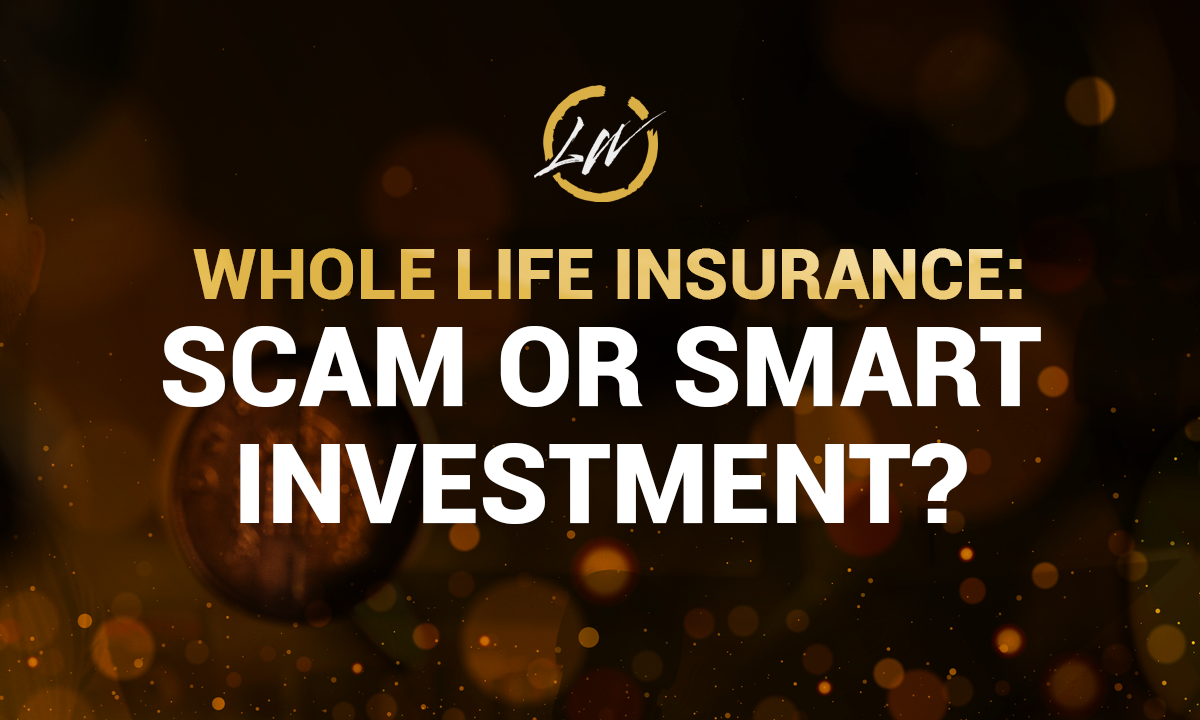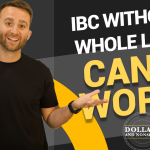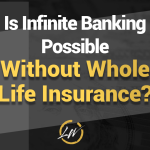The infinite banking system or whole life insurance is a topic that has sparked heated debates for years. On one side, there are fervent supporters boasting about its benefits for long-term financial security. On the other, there are vocal critics who simply see it as a scam, based on various concerns and misconceptions. In this article, we’ll delve deep into the heart of this controversy, exploring the criticisms, reasons for choosing infinite banking whole life insurance, and how understanding both sides can bridge the gap in this ongoing debate.
Why People Think The Infinite Banking System Is A Scam:
-
Whole life insurance is too expensive.
One of the primary criticisms against infinite banking whole life insurance, is its high cost. Critics argue that the premiums associated with whole life policies can be too expensive, especially compared to alternative investment options. And yes, we do agree that they are expensive, they’re not cheap, but people who practice infinite banking don’t look at the premiums as expenses but as long term investments with benefits and stability that whole life insurance offers, which can outweigh the initial costs.
-
Agents are in it for the commissions.
Another common misconception is that agents promoting whole life insurance are solely motivated by commissions. While it’s true that agents earn commissions from selling insurance products, many are genuinely passionate about the value of whole life insurance for their clients’ financial security. It’s important to work with a trusted agent who prioritizes your best interests and provides transparent guidance.
-
Return rates are too low.
Critics often argue that the return rates associated with whole life insurance policies are too low to justify the investment. While it’s true that the returns may not match those of riskier investment vehicles, such as stocks or real estate, whole life insurance offers a unique combination of guaranteed growth and stability. The steady, predictable returns can provide peace of mind, especially during times of economic uncertainty.
-
How does it make sense to pay interest to use my own money?
Some skeptics question the concept of borrowing against the cash value of a whole life insurance policy and paying interest on the loan. They argue that it seems counterintuitive to pay interest on your own money. However, it’s essential to understand that policy loans provide policyholders with access to liquidity while preserving the growth of their cash value. The interest paid on these loans helps maintain the financial integrity of the policy and ensures that the death benefit remains intact for beneficiaries. So, you’re not paying interest on your own money, you’re paying interest on the policy loan and cash of the whole life insurance company, and using your money as collateral.
-
The insurance company steals your cash value when you die:
Another common misconception is that insurance companies confiscate the cash value of a whole life insurance policy upon the policyholder’s death. In reality, the death benefit paid out to beneficiaries typically exceeds the accumulated cash value, ensuring that loved ones receive a substantial payout. Whole life insurance provides a valuable financial safety net for beneficiaries, offering peace of mind and financial security in the event of the policyholder’s death.
Our “Dollars and Nonsense” podcast host, Nate Scott, goes in depth into this topic in this episode here.
Reasons for Choosing Whole Life Insurance:
-
It’s one of the best places to store capital in a tax-free area.
Infinite Banking whole life insurance policies offer a unique advantage as a tax-efficient vehicle for storing capital. The cash value growth within the policy accumulates tax-free, allowing policyholders to maximize their savings potential without worrying about tax implications on investment gains.
-
You get an interest-only line of credit for life.
Unlike traditional banking, whole life insurance policies provide policyholders with access to liquidity through policy loans. These loans allow individuals to borrow against the cash value of their policy while maintaining the growth of their investment. Unlike traditional loans, policy loans typically require only the payment of interest, providing flexibility and financial security for policyholders. Once they take out those policy loans, they can then use them to fund other investments.
-
Built-in estate and legacy planning.
The infinite banking concept works as a powerful tool for estate and legacy planning, allowing policyholders to pass on wealth to their heirs tax-efficiently. The death benefit paid out to beneficiaries is typically income tax-free and can help cover estate taxes, final expenses, and provide financial support for loved ones after the policyholder’s death.
-
The ability to fund other investments using policies
One of the best benefits of the infinite banking strategy is that it offers policyholders the flexibility to leverage their cash value to fund other investments or financial opportunities. Whether it’s starting a business, purchasing real estate, or investing in the stock market, policyholders can use their policy as collateral or a source of capital to pursue additional wealth-building ventures.
-
The potential for safe, tax-free passive income
One of the key benefits of whole life insurance is its potential to generate safe, tax-free passive income through policy dividends and withdrawals. As the cash value of the policy grows over time, policyholders may choose to access their funds through dividends or withdrawals, providing a steady stream of income without tax implications. This passive income can supplement retirement savings, provide financial stability during downturns, and support long-term financial goals.
If you want to learn more about becoming your own banker, check out our podcast episode about “How To Become A Master Family Banker In 3 Steps”
Bridging the Gap
Understanding both sides of the debate surrounding the concept of infinite banking and whole life insurance is crucial for fostering meaningful dialogue and promoting financial literacy. While people who practice whole life insurance emphasize its benefits as a long-term financial strategy, critics often raise valid concerns about its cost and perceived limitations. However, by taking a nuanced approach and considering the perspectives of both sides, you can gain a comprehensive understanding of the topic.
People who practice infinite banking with whole life insurance argue that it offers unique advantages like tax-free growth, access to liquidity, and estate planning benefits. They highlight the policy’s ability to provide a secure financial foundation, protect against market volatility, and generate tax-free income in retirement. They also emphasize the importance of long-term wealth accumulation and legacy planning, positioning whole life insurance as a valuable tool for building generational wealth.
On the other hand, people who prefer accumulating money or strive for retirement often point out the perceived drawbacks of whole life insurance, including high premiums, lower returns compared to alternative investments, and concerns about policy fees and commissions. Skeptics may question the necessity of whole life insurance in a diversified financial portfolio, preferring more traditional investment vehicles with potentially higher returns. Additionally, critics may raise concerns about the complexity of whole life insurance policies and the risk of policy lapses if premiums become unaffordable.
However, by engaging in open dialogue and considering the merits of both perspectives, individuals can gain a more balanced understanding of whole life insurance and its role in financial planning. Rather than viewing the debate as a binary choice between right and wrong, it is essential to recognize the nuances and trade-offs associated with different financial strategies.
What might work for one, could not work for another. So, when making decisions about your financial strategy and whether or not you want to become your own banker with infinite banking, you need to make sure you study the concept really well and decide if it fits into your overall view of money and personal finance.
Ultimately, bridging the gap between those who practice infinite banking and those you don’t requires education, transparency, and a willingness to explore alternative viewpoints. By fostering understanding and promoting informed decision-making, you can navigate the complexities of financial planning with confidence and clarity.
In conclusion, the debate over whole life insurance is complex and differs from person to person. While there are valid criticisms to consider, there are also compelling reasons why many people choose whole life insurance for their financial planning needs. So, before dismissing whole life insurance as a scam, take the time to explore its benefits and consider how it might fit into your overall financial strategy.And if you want to learn more about Infinite Banking and see if it fits with your personal financial strategy, we highly recommend taking our FREE Infinite Banking course here. It is the best course on the market that teaches you everything you need to know about Infinite Banking from A to Z.






